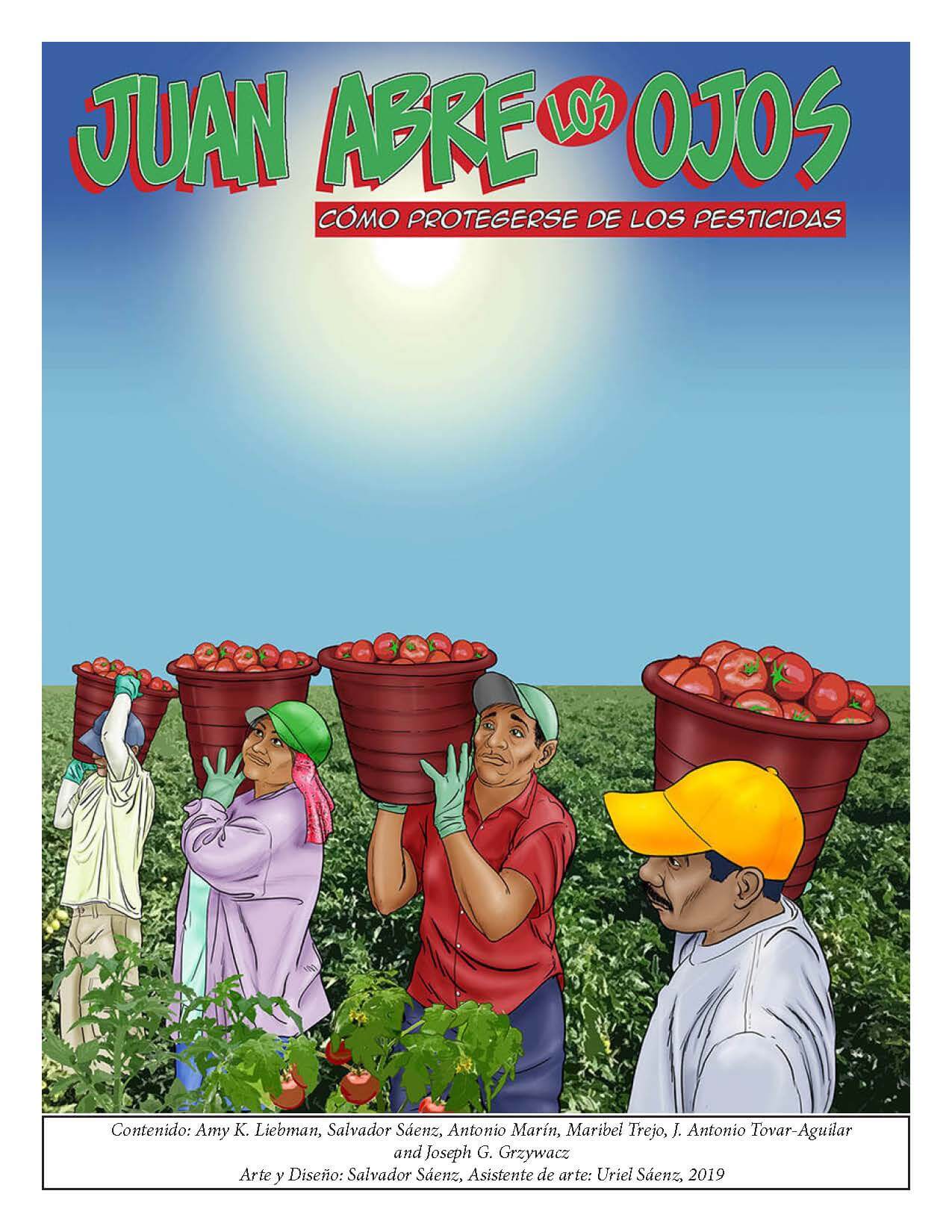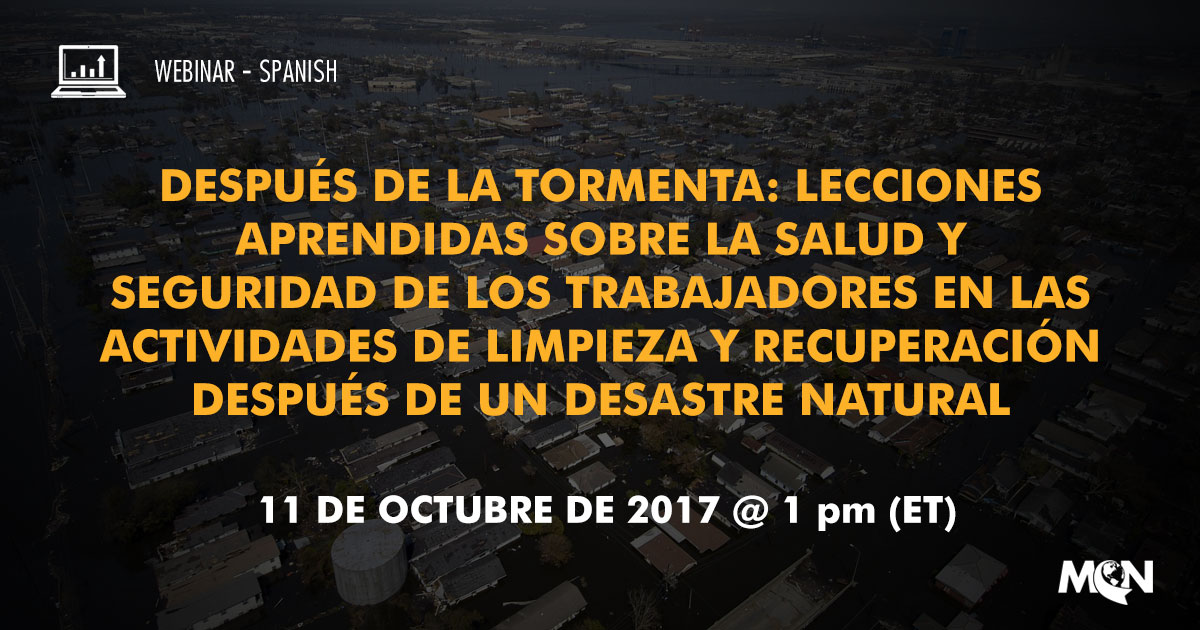These infographics and social media cards are simple and bright. The order in which the recommendations are presented is great.
This list of resources was selected because of the breadth of languages and the simplicity of the infographics.
APHA's Get Ready campaign helps Americans prepare themselves, their families and their communities for all disasters and hazards, including pandemic flu, infectious disease, natural disasters and other emergencies.
The Hesperian provides excellent patient education material on COVID-19 in a number of languagues for use internationally or with immigrant communiites in the United Sates.
Diabetes is a common but complicated health condition facing agricultural workers within the United States. To help assist agricultural workers in learning about this diagnosis, Migrant Clinicians Network has partnered with professional artist and collaborator Salvador Sáenz to create “Mi salud es mi tesoro: Un guía para vivir bien con diabetes,” or, “My Health is My Treasure: A Guide to Living Well with Diabetes.” This low-literacy comic book explores the topic through the full-color story of an agricultural farmworker named Goyo, whose recent diagnosis of diabetes prompts him to engage in conversations with other agricultural workers on topics of diet, exercise, and illness prevention while facing the unique hurdles of living a life of migration. The comic book was originally produced in Spanish, and is now available in English below. Please click "Leer en español" above to access the Spanish-language version.
In order to print the right number of comic books, we are asking organizations to pre-order in quantities up to 500. The comic book and shipping will be paid for by MCN. In exchange, we simply ask that you, or someone from your organization, complete an evaluation of the comic book several months after you first receive it. Information from the evaluation will help us improve our resources and will give us important insight into how the comic book is being used in the community.
Download a digital copy of the comic book below!
- 2022-6-13_My-Health-Is-My-Treasure_Comic_WEB.pdf (4.97 MB)
- 2022-6-13_My-Health-Is-My-Treasure_Comic_PRINT.pdf (38.95 MB)
- 2023-8-4_Mi-salud-es-mi-tesoro_Comic_WEB_0.pdf (4.87 MB)
- 2023-8-4_Mi-salud-es-mi-tesoro_Comic_PRINT.pdf (38.74 MB)
- 2023-8-21_Mi-salud-es-mi-tesoro_PuertoRico_Web_0.pdf (5.74 MB)
- 2023-8-21_Mi-salud-es-mi-tesoro_PuertoRico_PRINT.pdf (40.76 MB)

This comic book tells us how Juan learned to protect himself from pesticides at work. This resource presents in a very simple and entertaining way what are the sources of exposure to pesticides, their short- and long-term effects on the body, and what can be done to protect oneself from them. It is a great resource for farmworkers and promotores de salud!
These Spanish and English cholesterol patient education resources were developed by the University of Texas Health Science Center at Houston and the School of Public Health, El Paso Regional Campus. The artwork was done by Salvador Saenz, a well-known and respected public health educator and artist based in El Paso, TX
- CHOLESTEROL NOVELLA fast version_0.pdf (2.99 MB)
- CHOLESTROL PROMOTORA GUIDE fast version_1.pdf (623.95 KB)
- COLESTEROL NOVELA version rapida_0.pdf (2.97 MB)
- COLESTROL GUIA PROMOTORA version rapida_0.pdf (631.83 KB)
These Spanish and English hypertension patient education resources were developed by the University of Texas Health Science Center at Houston and the School of Public Health, Ele Paso Regional Campus. The artwork was done by Salvador Saenz, a well-known and respected public health educator and artist based in El Paso, TX.
- HIPERTENSION GUIA PROMOTORA version rapida.pdf (892.13 KB)
- HIPERTENSION NOVELA version rapida.pdf (2.15 MB)
- HYPERTENSION NOVELLA fast version.pdf (2.07 MB)
- HYPERTENSION PROMOTORA GUIDE fast version_0.pdf (810.49 KB)
- SODIO GUIA PROMOTORA version rapida_0.pdf (607.74 KB)
- SODIO NOVELA version rapida_0.pdf (2.2 MB)
- SODIUM NOVELLA fast version_0.pdf (2.18 MB)
- SODIUM PROMOTORA GUIDE fast version.pdf (598.15 KB)
¡Hazlo por ellos! Pero por ti también. Historias de tres mujeres latinas y sus desafíos y éxitos en mantener un estilo de vida saludable para disminuir o retrasar el desarrollo de la diabetes tipo 2. Disponible en español e inglés.
Incluye guías, carteles, concursos, música y podcasts, y recursos de capacitación y evaluación. Disponible en español.
Application Deadline: 04/15/2018 at 5 pm CST
The Underserved Occupational Populations Section of ACOEM is sponsoring one $1,000 scholarship to qualified residents and medical students interested in making significant contributions to the field of underserved occupational medicine.The scholarship was established in honor of Joseph A. Fortuna, MD, FACOEM who founded the Underserved Occupational Populations Section of ACOEM and who was a tireless supporter of underserved workers and their families.
- JAF Memorial Scholarship to AOHC.3.pdf (284.44 KB)
This new poll, taken by Migrant Clinicians Network in January and February 2018, reflected the experiences of clinical staff from 26 states across the country. Respondents came from every corner of the clinic; occupations listed include Physician, Executive Director, Dental Assistant, Outreach Specialist, Therapist, Community Health Worker, Registered Nurse, and 24 other occupations. The poll follows up on MCN’s 2017 poll, in which 63 percent of respondents indicated that immigrant and mobile patients’ attitudes and feelings toward health care access had changed.
- Poll Results February 2018.pdf (92.89 KB)
"The Global Report on Internal Displacement presents the latest information on internal displacement worldwide caused by conflict, violence and disasters."
"These materials are designed to be simple and useful in helping physicians and health-care professionals to meet the needs of their patients who may be undocumented or suffering stresses related to close family or community members being undocumented. While there are many toolkits being developed, we hope that these materials might be very easy to use and enable the physician or other health-care professional to address the most immediate needs of such patients."

FECHA: 11 de Octubre de 2017 @ 1 PM (ET)
PRESENTADORES:
- Alma R. Galván, MHC, Migrant Clinicians Network
- Richard Rabin, MassCOSH
- Rossana Coto-Batres, MSW, Northeast New York Coalition for Occupational Safety and Health (NENYCOSH)
Crédito de educación continua
Para recibir credito de Trabajador/a de Salud Comunitaria o Educacion de Continua de Enfermera después de ver alguno de estos seminarios usted debe hacer lo siguiente:
- Completar la evaluación participante asociado a cada webinar
- Enviar un correo electrónico con su nombre y apellido indicando que ha completado a malvarado@migrantclinician.org
Descripción
Conforme las familias regresan a sus hogares en Houston, una vez que las inundaciones causadas por los Huracanes Irma y María se van retirando, esto se convierte en una carrera contra el tiempo. Un olor sofocante llena los cuartos de las casas, los charcos permanecen en los pasillos, y el moho se multiplica rápidamente. En cuestión de días, los patios ensopados de los vecinos se convierten en tiraderos de basura, conforme los trabajadores empiezan a quitar de las casas las paredes con moho, los pisos y los cielos destruidos, así como los muebles dañados. En este proceso, los trabajadores y muchos residentes se exponen al agua contaminada con químicos y basura, materiales de construcción peligros y alimañas dañinas. Pero hay otros riesgos adicionales, estructuras inestables y posibles intoxicaciones por monóxido de carbono de los generadores que trabajan incansablemente en espacios con poca ventilación. La exposición a asbestos, sílice y plomo son también peligros comunes para estos trabajadores.
Katrina, Sandy, Harvey, Irma y ahora Maria: son nombres de tormentas que nos indican las diferentes comunidades que terminaron bajo el agua, pero muchas de las historias emanadas de ellas, sobre la limpieza -- y los peligros involucrados-- son las mismas. Con resiliencia y determinación, las comunidades se tratan de reconstruir, pero la reconstrucción necesita una fuerza de trabajo inmediata, lista para este trabajo peligroso y extenuante.
Las operaciones de recuperación después del desastre, limpieza y reconstrucción presentan muchos riesgos y peligros para los trabajadores. Muchos de ellos realizan este trabajo sin el equipo de seguridad o el entrenamiento de mitigación de peligros adecuado.
En la recuperación de una supertormenta, ¿cuáles son las vulnerabilidades que los trabajadores enfrentan y qué significa eso para la seguridad y la salud del trabajador? Las siguientes preguntas surgen para los proveedores y trabajadores de salud comunitarios que cuidan y se preocupan por estos trabajadores: ¿cuáles son los puntos claves que necesitamos entender para poder cuidar de aquellos involucrados en estos esfuerzos de limpieza y reconstrucción? y ¿qué podemos hacer para que ellos mismos prevengan las lesiones y las enfermedades?
Este seminario en línea recupera experiencias obtenidas de desastres naturales anteriores y ofrece recursos que le pueden guiar en su trabajo. Ofreceremos casos reales para ilustrar los peligros y revisaremos formas en que los trabajadores se pueden proteger a sí mismos, incluyendo el entendimiento de sus derechos y responsabilidades.
Objetivos de aprendizaje
- Los participantes identificarán los peligros más comunes y críticos que los trabajadores y residentes encuentras cuando se involucran en la demolicion y reconstruccion despues de un desastre.
- Los participantes articularán las mejores estrategias para educar a los trabajadores y residentes sobre como prevenir lesiones y enfermedades durante las actividades de limpieza y reconstrucción después de huracanes y supertormentas.
- Los participantes enlistarán al menos tres recursos que pueden usar para guiar a los trabajadores y residentes durante la demolición y reconstrucción después de un desastre.
Este proyecto cuenta con el apoyo de la Administración de Recursos y Servicios de Salud (HRSA) del Departamento de Salud y Servicios Humanos de los Estados Unidos bajo el acuerdo de cooperación número U30CS09742, Asistencia Técnica a Centros de Salud Comunitarios y Migrantes y Personas sin Hogar por $ 1,094,709.00 con 0% del total Proyecto NCA financiado con fuentes no federales. Esta información o contenido y las conclusiones son las del autor y no deben ser interpretadas como la posición o política oficial de, ni cualquier endosos deben ser inferidos por HRSA, HHS o el Gobierno de los Estados Unidos.
Offers basic screening questions, common occupations and ailments associated with them, as well as recommended treatment. Also includes sample letters from clinicians to employers for restricted work.
This resource offers training for community based organizations and workers in the aftermath of natural disasters. It includes educational materials as well as trainer guides and tools.
Blog post from the U.S. Department of Labor highlighting common hazards during hurricane cleanup as well as links to additional readings.
Information on keeping food and water safe for consumption and best hygiene practices in the face of disasters.
Offers tips about potential hazards and protective strategies during disaster cleanup.
This page highlights important tools for clinicians as well as diagnoses to consider when caring for disaster-affected patients.
United for Puerto Rico is an initiative brought forth by the First Lady of Puerto Rico, Beatriz Rosselló, in collaboration with the private sector, with the purpose of providing aid and support to those affected in Puerto Rico by the passage of Hurricane Irma and Hurricane María. 100% of the proceeds will go to helping the victims afteced by these natural disasters in Puerto Rico.
This site includes various helpful links including information on health hazards, mold remediation, respirator use, and related policy information.
Comprehensive flood information including links to preparedness and response/recovery pages.
Comprehensive hurricane information including links to preparedness and response/recovery pages.
"To assist health centers in obtaining Federal Emergency Management Agency (FEMA) funding for damaged or destroyed facilities, Capital Link has developed Hurricane Recovery Resources for Health Centers, supported by the Health Resources and Services Administration."
"The Human Diagnosis Project (also referred to as "Human Dx" or "the Project") is a worldwide effort created with and led by the global medical community to build an online system that maps the best steps to help any patient. By combining collective intelligence with machine learning, Human Dx intends to enable more accurate, affordable, and accessible care for all."